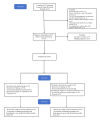Metaverse Clinic for Pregnant Women With Subclinical Hypothyroidism: Prospective Randomized Study
- PMID: 39908543
- PMCID: PMC11840391
- DOI: 10.2196/64634
Metaverse Clinic for Pregnant Women With Subclinical Hypothyroidism: Prospective Randomized Study
Abstract
Background: Health care is experiencing new opportunities in the emerging digital landscape. The metaverse, a shared virtual space, integrates technologies such as augmented reality, virtual reality, blockchain, and artificial intelligence. It allows users to interact with immersive digital worlds, connect with others, and explore unknowns. While the metaverse is gaining traction across various medical disciplines, its application in thyroid diseases remains unexplored. Subclinical hypothyroidism (SCH) is the most common thyroid disorder during pregnancy and is frequently associated with adverse pregnancy outcomes.
Objective: This study aims to evaluate the safety and effectiveness of a metaverse platform in managing SCH during pregnancy.
Methods: A randomized controlled trial was conducted at Fujian Provincial Hospital, China, from July 2022 to December 2023. A total of 60 pregnant women diagnosed with SCH were randomly assigned into two groups: the standard group (n=30) and the metaverse group (n=30). Both groups received levothyroxine sodium tablets. Additionally, participants in the metaverse group had access to the metaverse virtual medical consultations and metaverse-based medical games. The primary outcomes were adverse maternal and offspring outcomes, and the secondary outcomes included the neurobehavioral development of offspring and maternal psychological assessments.
Results: Of the 30 participants in each group, adverse maternal outcomes were observed in 43% (n=13) of the standard group and 37% (n=11) of the metaverse group (P=.60). The incidence of adverse offspring outcomes was 33% (n=10) in the standard group, compared to 7% (n=2) in the metaverse group (P=.01). The Gesell Development Scale did not show significant differences between the two groups. Notably, the metaverse group demonstrated significantly improved scores on the Self-Rating Depression Scale and the Self-Rating Anxiety Scale scores compared to the standard group (P<.001 and P=.001, respectively).
Conclusions: The use of metaverse technology significantly reduced the incidence of adverse offspring outcomes and positively impacted maternal mental health. Maternal adverse outcomes and offspring neurobehavioral development were comparable between the two groups.
Trial registration: Chinese Clinical Trial Registry ChiCTR2300076803; https://www.chictr.org.cn/showproj.html?proj=205905.
Keywords: adverse pregnancy outcomes; metaverse; neurobehavioral development; psychological health; subclinical hypothyroidism.
©Yuanyuan Zheng, Yizhen Chen, Yan Chen, Liang Lin, Ting Xue, Chuhui Chen, Junping Wen, Wei Lin, Gang Chen. Originally published in the Journal of Medical Internet Research (https://www.jmir.org), 05.02.2025.
Conflict of interest statement
Conflicts of Interest: None declared.
Figures




Similar articles
-
Exploring engagement patterns within a mobile health intervention for women at risk of gestational diabetes.Womens Health (Lond). 2025 Jan-Dec;21:17455057251327510. doi: 10.1177/17455057251327510. Epub 2025 Jun 5. Womens Health (Lond). 2025. PMID: 40470610 Free PMC article. Clinical Trial.
-
The Effect of a Mobile App (eMOM) on Self-Discovery and Psychological Factors in Persons With Gestational Diabetes: Mixed Methods Study.JMIR Mhealth Uhealth. 2025 Jun 4;13:e60855. doi: 10.2196/60855. JMIR Mhealth Uhealth. 2025. PMID: 40466096 Free PMC article.
-
Prenatal administration of progestogens for preventing spontaneous preterm birth in women with a multiple pregnancy.Cochrane Database Syst Rev. 2019 Nov 20;2019(11):CD012024. doi: 10.1002/14651858.CD012024.pub3. Cochrane Database Syst Rev. 2019. PMID: 31745984 Free PMC article.
-
Effects of Maternal Iodine Deficiency in Women with Mild Thyroid Dysfunction During Early Pregnancy on Mental and Motor Growth of Their Offspring During Levothyroxine Treatment.Biol Trace Elem Res. 2025 Sep 4. doi: 10.1007/s12011-025-04810-y. Online ahead of print. Biol Trace Elem Res. 2025. PMID: 40903653
-
Remapping Body Representation Using Virtual Reality in Chronic Neuropathic Pain: Systematic Review.J Med Internet Res. 2025 Jun 3;27:e71074. doi: 10.2196/71074. J Med Internet Res. 2025. PMID: 40341015 Free PMC article. Review.
Cited by
-
The Effects of Virtual Reality on Hope and Travel Expectations in Healthy and Hospitalized Children: Quasi-Experimental Design Approach.Interact J Med Res. 2025 Jun 16;14:e65311. doi: 10.2196/65311. Interact J Med Res. 2025. PMID: 40523232 Free PMC article.
References
-
- Cerasa A, Gaggioli A, Pioggia G, Riva G. Metaverse in mental health: the beginning of a long history. Curr Psychiatry Rep. 2024 Jun;26(6):294–303. doi: 10.1007/s11920-024-01501-8. https://europepmc.org/abstract/MED/38602624 10.1007/s11920-024-01501-8 - DOI - PMC - PubMed
-
- Checcucci E, Veccia A, Puliatti S, De Backer P, Piazza P, Kowalewski K, Rodler S, Taratkin M, Belenchon IR, Baekelandt L, De Cillis S, Piana A, Eissa A, Rivas JG, Cacciamani G, Porpiglia F. Metaverse in surgery - origins and future potential. Nat Rev Urol. 2024 Oct 30;:10.1038/s41585-024-00941-4. doi: 10.1038/s41585-024-00941-4.10.1038/s41585-024-00941-4 - DOI - PubMed
-
- Sadoughi F, Behmanesh A, Sayfouri N. Internet of things in medicine: a systematic mapping study. J Biomed Inform. 2020 Mar;103:103383. doi: 10.1016/j.jbi.2020.103383. https://linkinghub.elsevier.com/retrieve/pii/S1532-0464(20)30010-1 S1532-0464(20)30010-1 - DOI - PubMed
Publication types
MeSH terms
Substances
LinkOut - more resources
Full Text Sources
Medical
Miscellaneous

